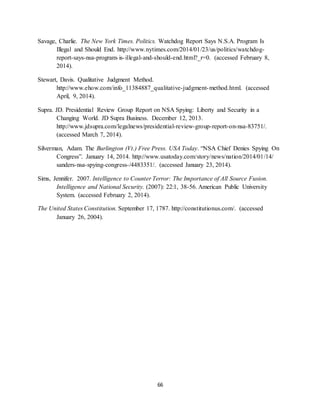This document is a thesis submitted to American Public University examining the justification for the NSA's domestic bulk data collection and surveillance program. It provides background on the NSA's origins and mission, as well as the laws governing domestic surveillance. It discusses the controversy around the NSA's activities following the Snowden leaks, debating whether the national security benefits outweigh civil liberty costs. The thesis conducts a qualitative analysis of sources on both sides and aims to determine if the current legal framework requires reform while still protecting national security within the Constitution.
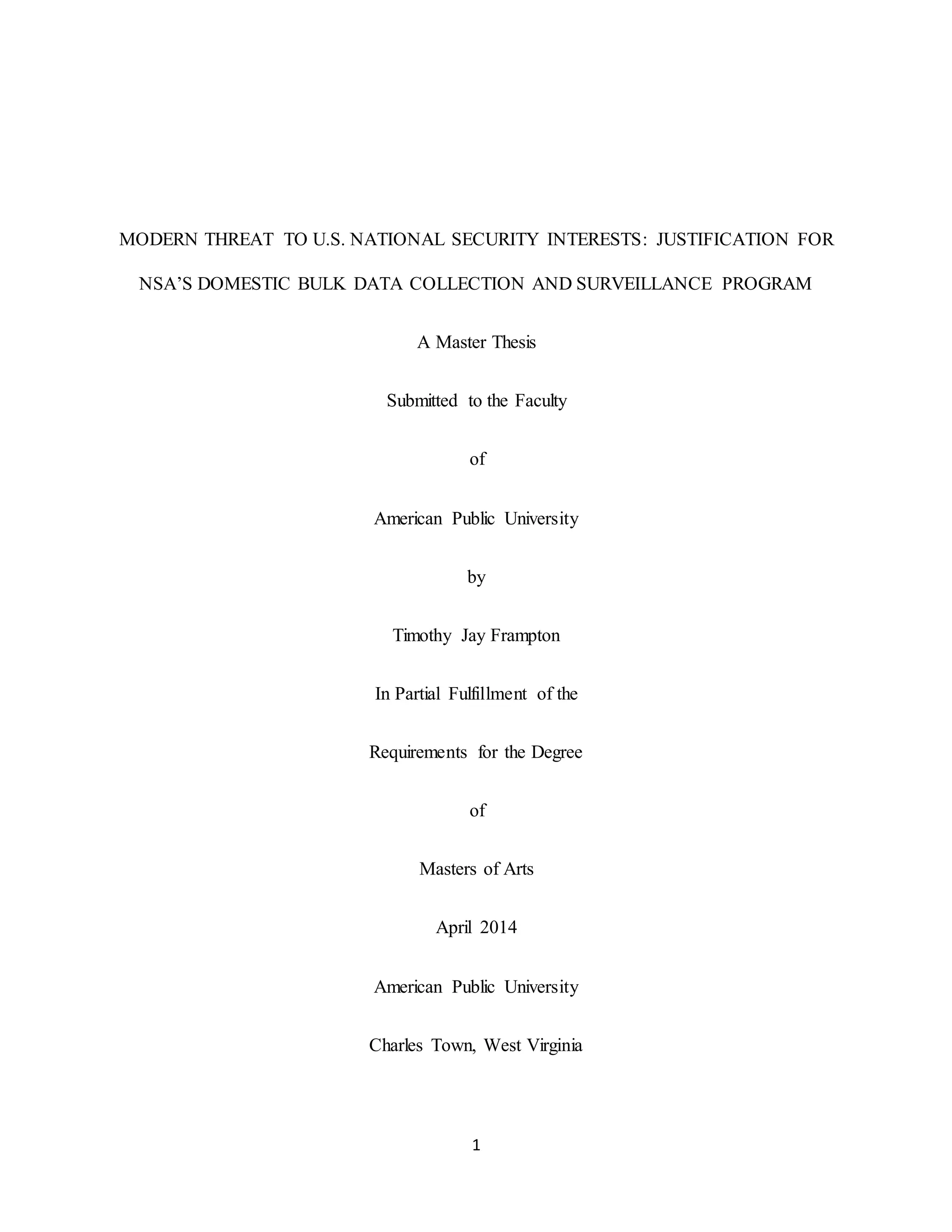
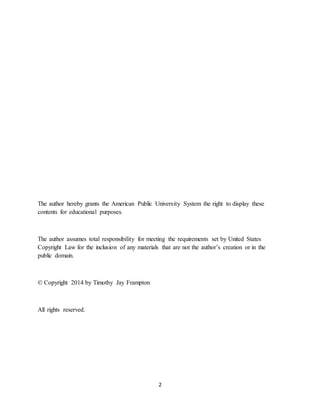
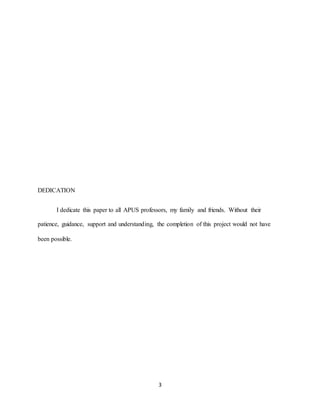

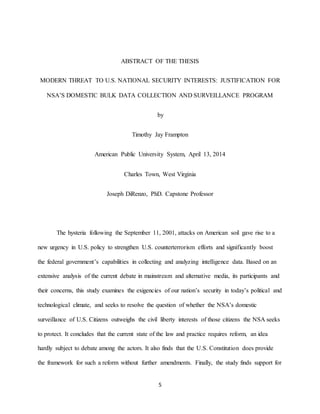

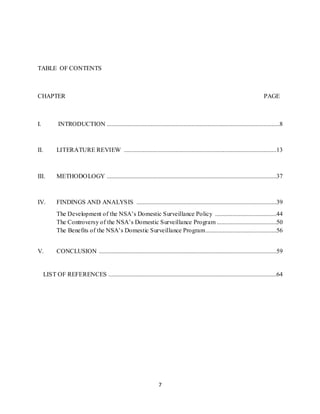
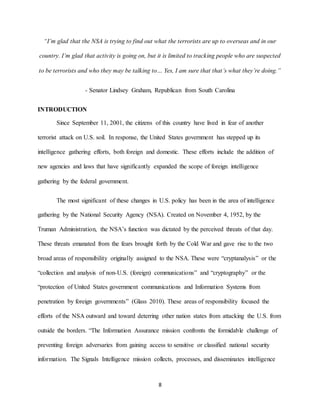
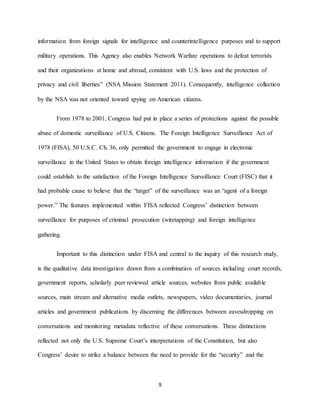
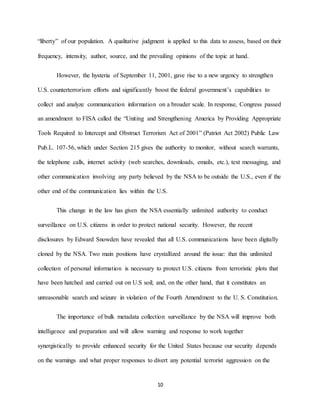
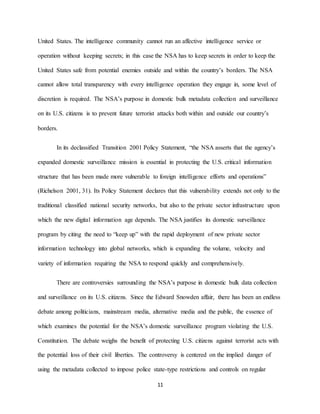
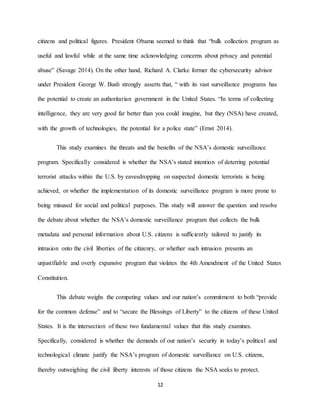
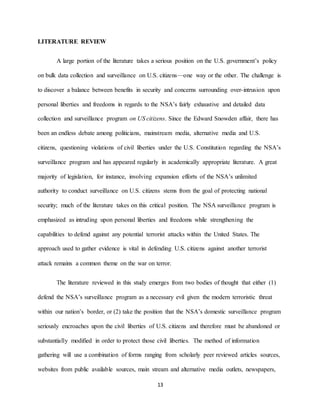
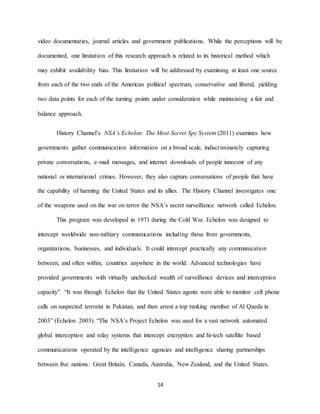
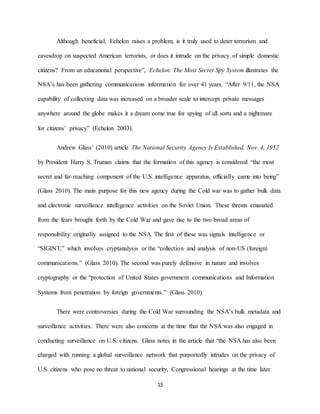
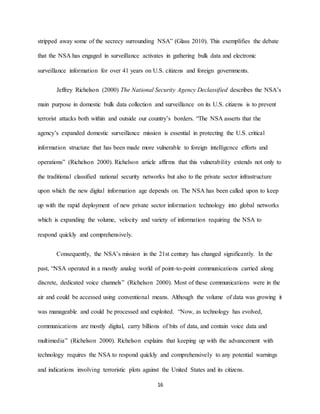
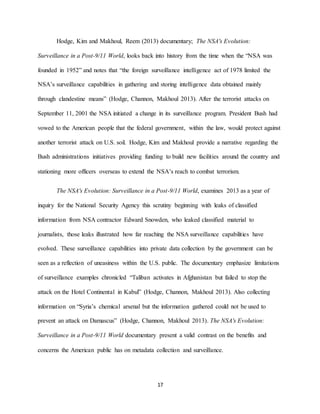
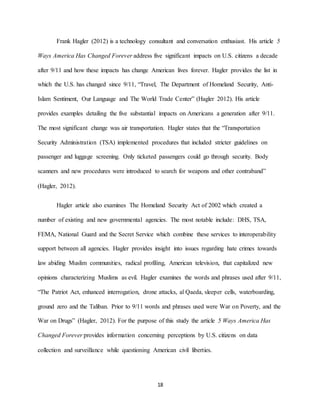
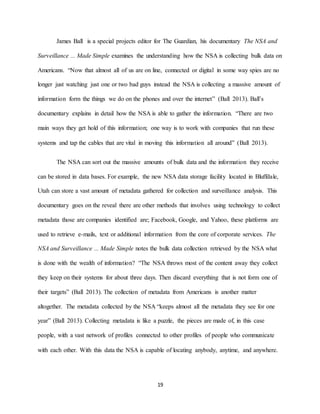
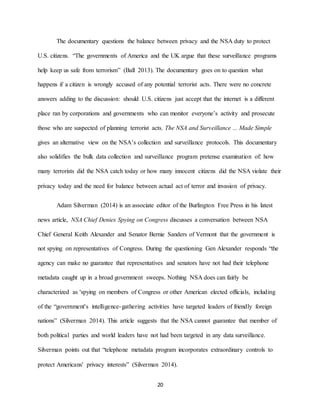
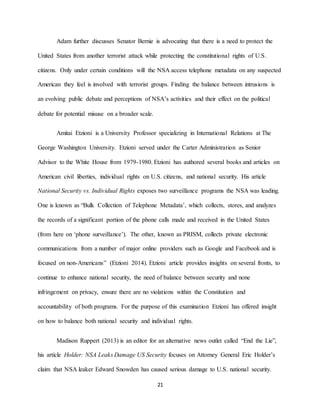
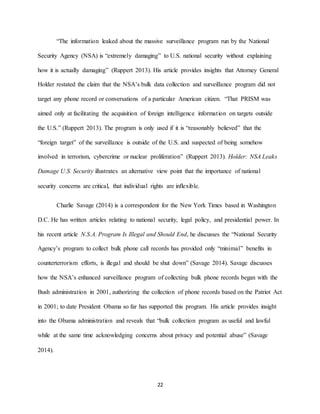
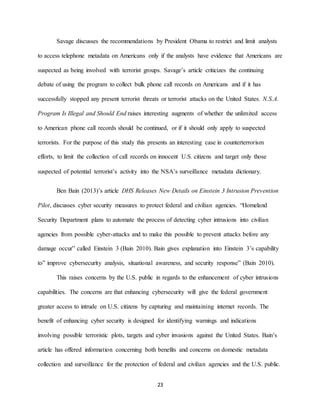
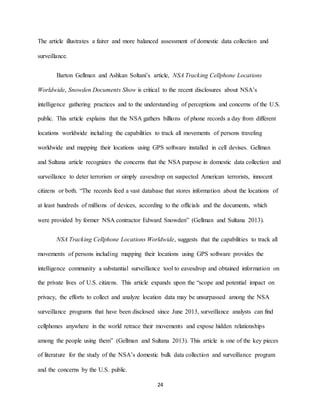
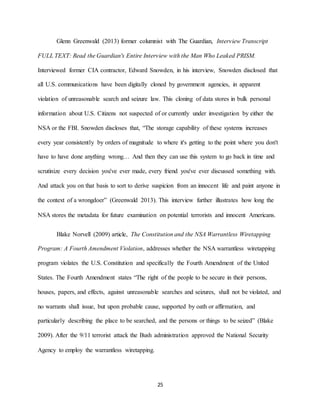
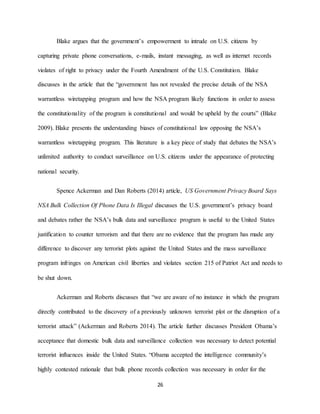
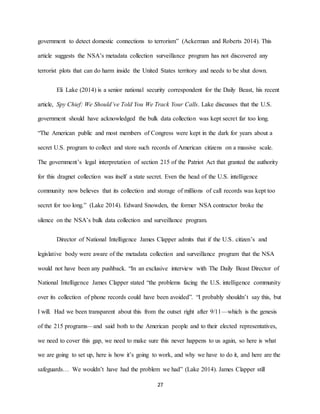
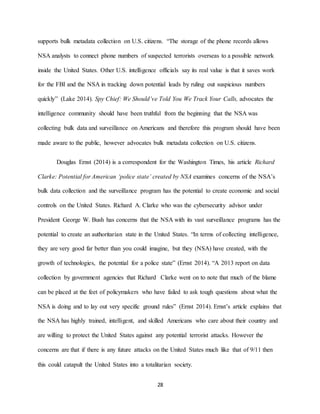
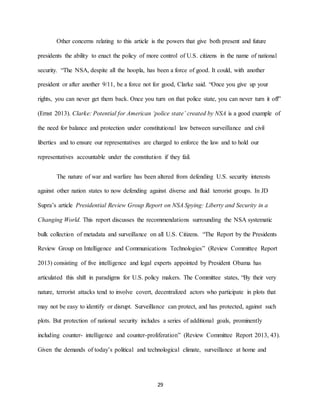
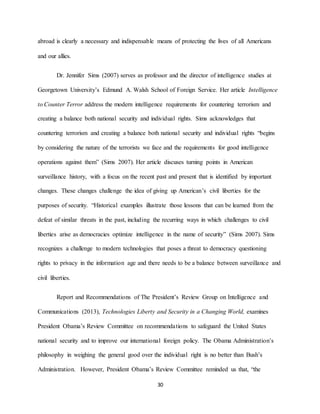
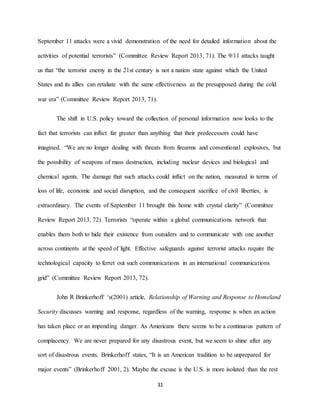
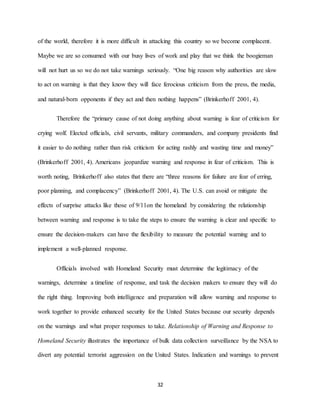
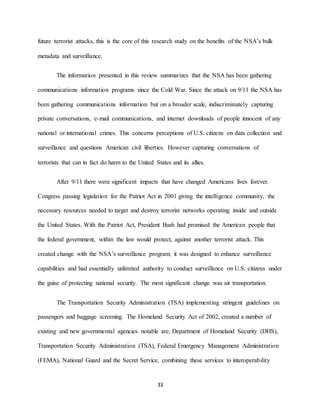
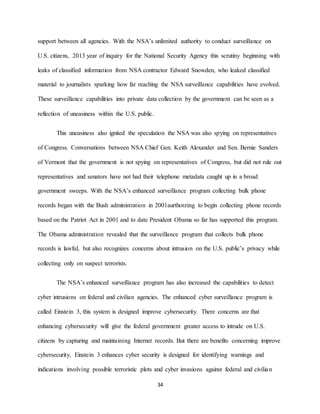
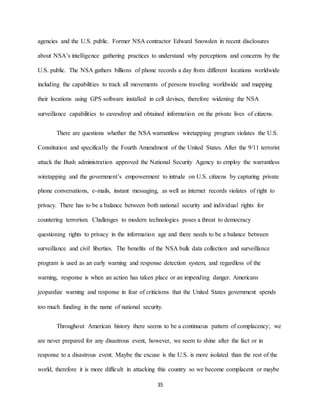
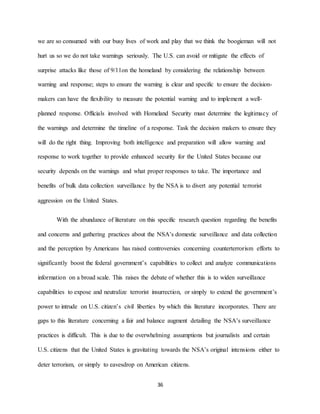
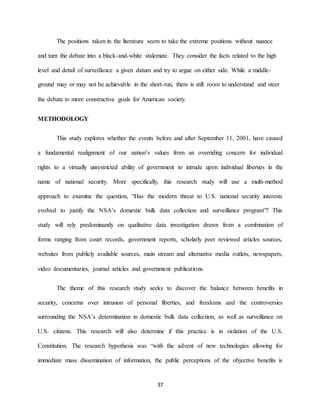
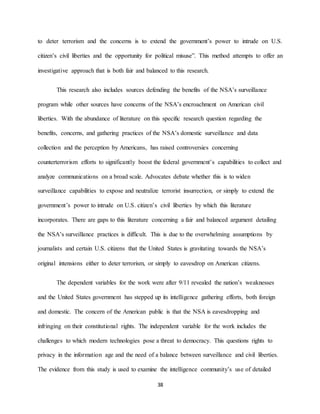
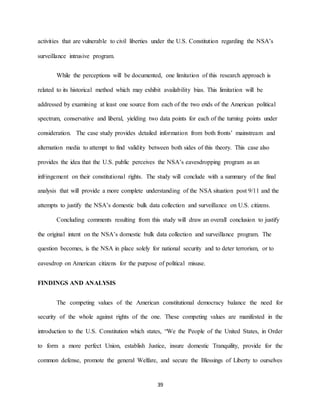
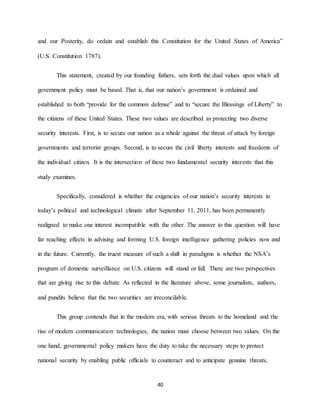
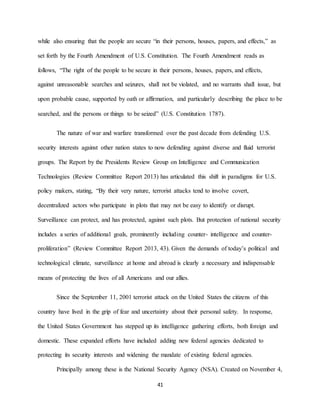
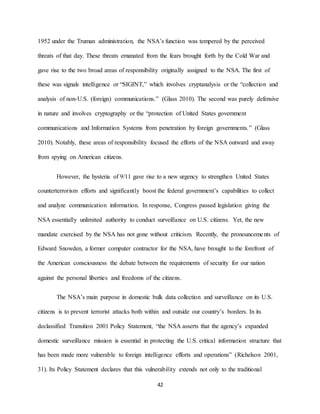
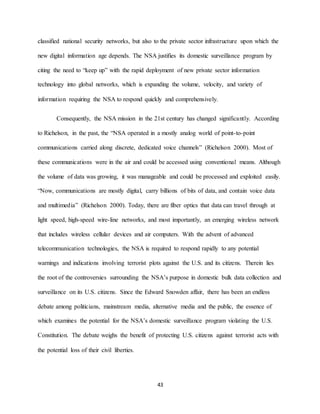
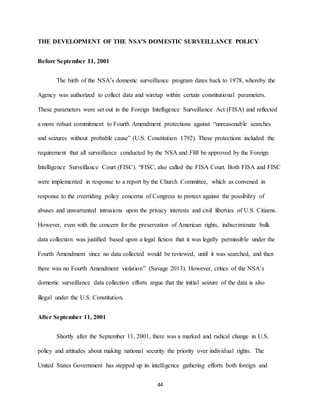
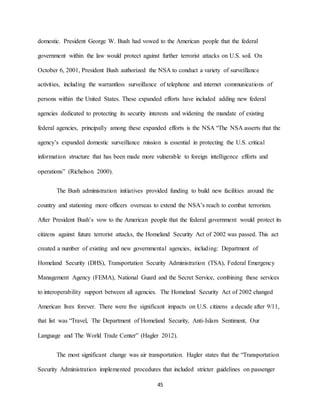
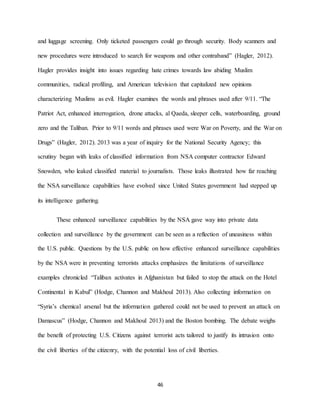
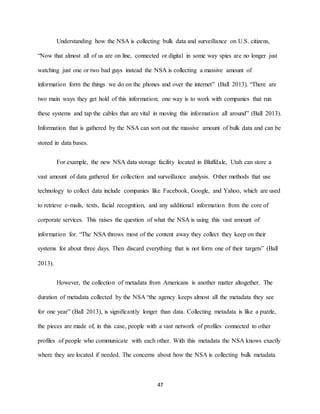
![48
and surveillance on U.S. citizens, “The governments of America and the UK argue that these
surveillance programs help keep us safe from terrorism” (Ball 2013).
With the recent Snowden documents, disclosures about NSA’s intelligence gathering
practices explain why the concerns of the U.S. public are so controversial. The NSA gathers
billions of phone records a day from different locations worldwide and has the capability to track
all movements of persons traveling worldwide by mapping their locations using GPS software
installed in cell devices. The NSA’s purpose in domestic data collection and surveillance is to
deter terrorism or simply eavesdrop on suspected American terrorists, innocent citizens, or both.
“The records feed a vast database that stores information about the locations of at least hundreds
of millions of devices, according to the officials and the documents, which were provided by
former NSA contractor Edward Snowden” (Gellman and Sultana 2013).
These metadata collection tracks expand upon the “scope and potential impact on
privacy, [and since] the efforts to collect and analyze location data may be unsurpassed among
the NSA surveillance programs that have been disclosed since June 2013, surveillance analysts
can find cellphones anywhere in the world retrace their movements and expose hidden
relationships among the people using them” (Gellman and Sultana 2013). There are two specific
surveillance programs the NSA is leading. One is known as “Bulk Collection of Telephone
Metadata, which collects, stores, and analyzes the records of a significant portion of the phone
calls made and received in the United States (from here on ‘phone surveillance’). The other,
known as PRISM, collects private electronic communications from a number of major online
providers such as Google and Facebook and is focused on non-Americans” (Etzioni 2014).
Talking about these two programs, United States Attorney General Eric Holder’s claimed that
NSA leaker Edward Snowden has caused serious damage to U.S. national security, that “the](https://image.slidesharecdn.com/ee06bdd0-3874-40df-b2f1-c381a88ab54e-160701164905/85/Master-Thesis-48-320.jpg)
![49
information leaked [by Snowden] about the massive surveillance program run by the National
Security Agency (NSA) is “extremely damaging” to U.S. national security without explaining
how it is actually damaging” (Ruppert 2013).
Information regarding the precise scope of the NSA’s domestic surveillance program has
fluctuated over the years until the passage of metadata that was recently confirmed by Edward
Snowden, a former NSA Contractor, in an interview with the Glenn Greenwald of the Guardian
newspaper. In his interview, Snowden disclosed that all U.S. communications have been digitally
cloned by government agencies, in apparent violation of the unreasonable search and seizure
law. This cloning of data stores bulk personal information about U.S. citizens not suspected of or
currently under investigation by either the NSA or the FBI. Snowden discloses, “The storage
capability of these systems increases every year consistently by orders of magnitude to where it's
getting to the point where you don't have to have done anything wrong. You simply have to
eventually fall under suspicion from somebody even by a wrong call. And then they can use this
system to go back in time and scrutinize every decision you've ever made, every friend you've
ever discussed something with. And attack you on that basis to sort to derive suspicion from an
innocent life and paint anyone in the context of a wrongdoer” (Greenwald 2013).
Attorney General Holder restated the claim that the NSA’s bulk data collection and
surveillance program did not target any phone record or conversations of a particular American
citizen. “That PRISM was aimed only at “facilitating the acquisition of foreign intelligence
information on targets outside the United States. The program is only used if it is “reasonably
believed” that the “foreign target” of the surveillance is outside of the U.S. and suspected of
being somehow involved in terrorism, cybercrime or nuclear proliferation” (Ruppert 2013). This
illustrates an alternative view point that the importance of national security concerns are critical,](https://image.slidesharecdn.com/ee06bdd0-3874-40df-b2f1-c381a88ab54e-160701164905/85/Master-Thesis-49-320.jpg)
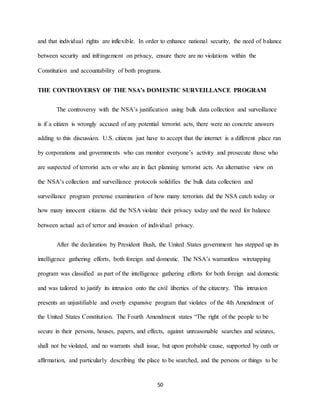
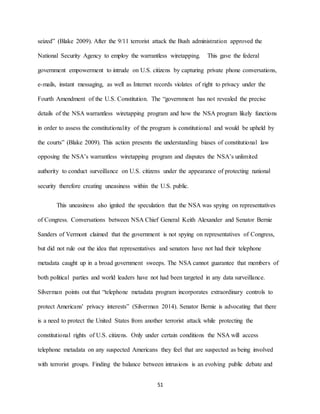
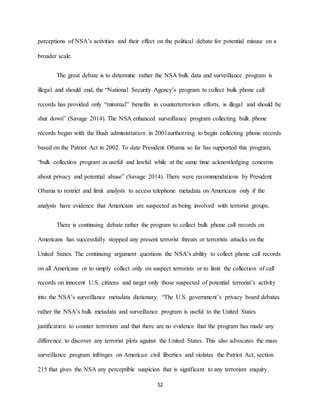
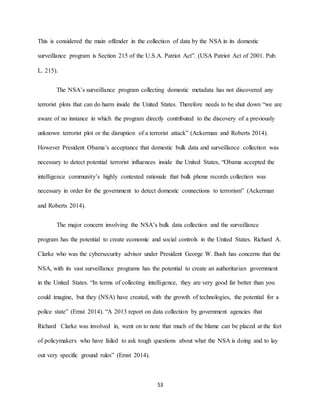
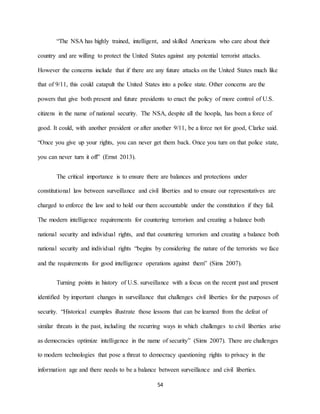
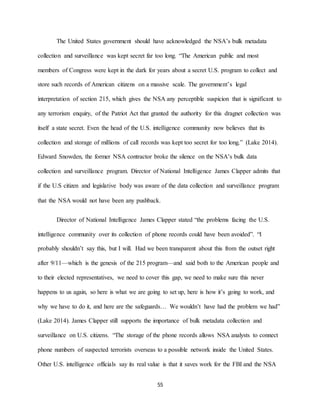
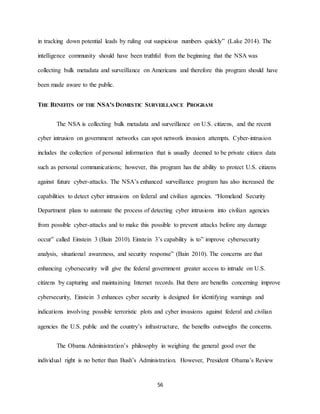
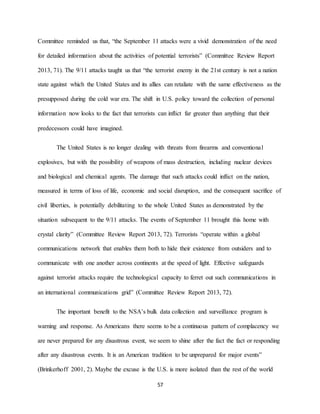
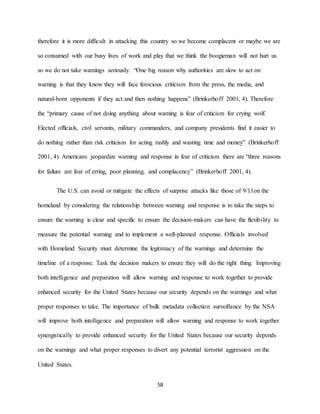
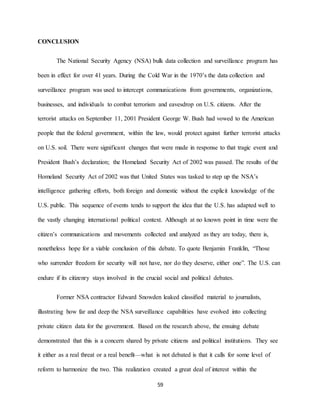
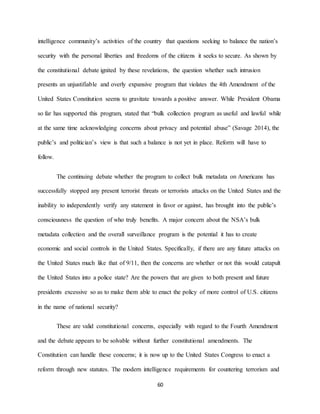
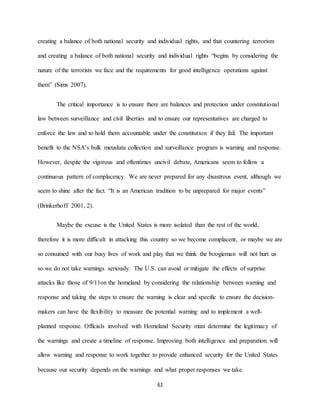
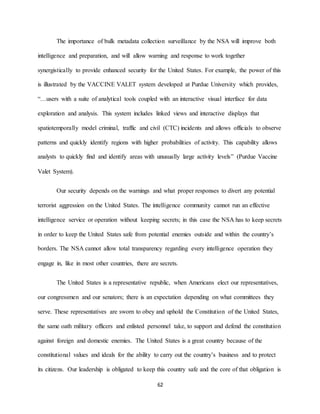
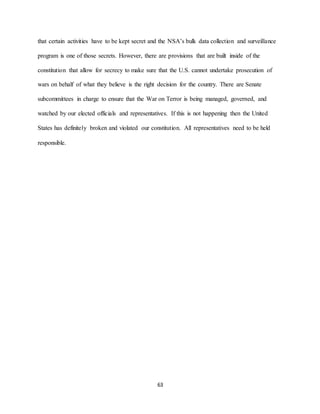
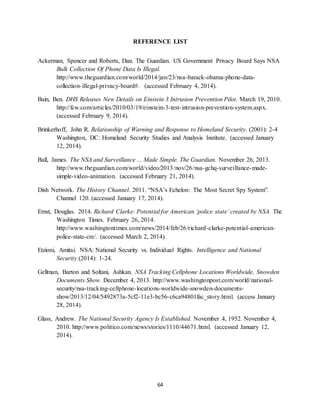
![65
Greenwald, Glenn. Edward Snowden Interview Transcript Full Text: Read the Guardian's
Entire Interview With the Man Who Leaked PRISM. The Guardian. June 9, 2013.
http://www.policymic.com/articles/47355/edward-snowden-interview-transcript-full-text-
read-the-guardian-s-entire-interview-with-the-man-who-leaked-prism. (accessed March
14, 2014).
Hagler, Frank. 2012. World Terrorism 5 Ways America Has Changed Forever.
http://www.policymic.com/articles/14495/9-11-htm. (accessed January12, 2014).
Herman, Susan N. The United States Patriot Act of 2001. Pub. L. 215, 2001.
https://www.aclu.org/files/pdfs/about/herman_usapaf.pdf. (accessed April 6, 2014).
Hodge, Channon, Kim, Alyssa and Makhoul, Reem. The New York Times. The NSA's
Evolution: Surveillance in a Post-9/11 World. Video Documentary. Aired November 4,
2013. (accessed January 3, 2014).
Lake Eli. Daily Beast. Spy Chief: We Should’ve Told You We Track Your Calls. February 18,
2014. http://www.thedailybeast.com/articles/2014/02/17/spy-chief-we-should-ve-told-
you-we-track-your-calls.html. (accessed February 24, 2014).
Malik, Abish, Maciejewski, Ross, Collins, Timothy F. and Ebert, David S. Purdue University
Visualization and Analytics Center. Visual Analytics Law Enforcement Toolkit.
.https://www.purdue.edu/discoverypark/vaccine/assets/pdfs/publications/pdf/Visu
l%20Analytics%20Law%20Enforcement%20Toolkit.pdf]. (accessed April 21, 2014).
National Security Agency Central Security Service. http://www.nsa.gov/about/mission/. April
15, 2011. (accessed April 6, 2014).
Norvell, Blake C. The Constitution and the NSA Warrantless Wiretapping Program: A Fourth
Amendment Violation. Yale Journal of Law and Technology. Issue 1. Volume 11.Article
8. (2009):1-1.
Report and Recommendations of The President’s Review Group on Intelligence and
Communications. Liberty and Security in a Changing World. December 12, 2013.
http://www.whitehouse.gov/sites/default/files/docs/2013-12-12_rg_final_report.pdf.
(accessed February 23, 2014).
Richelson, Jeffrey. The National Security Agency Declassified. January 13, 2000.
http://www2.gwu.edu/~nsarchiv/NSAEBB/NSAEBB24/. (accessed February 9, 2014).
Ruppert, Madison. Holder: NSA Leaks Damage US Security. The Truth Unites. June 15, 2013.
http://www.thetruthunites.com/united-states/holder-nsa-leaks-damage-security/.
(accessed February 23, 2014).](https://image.slidesharecdn.com/ee06bdd0-3874-40df-b2f1-c381a88ab54e-160701164905/85/Master-Thesis-65-320.jpg)
